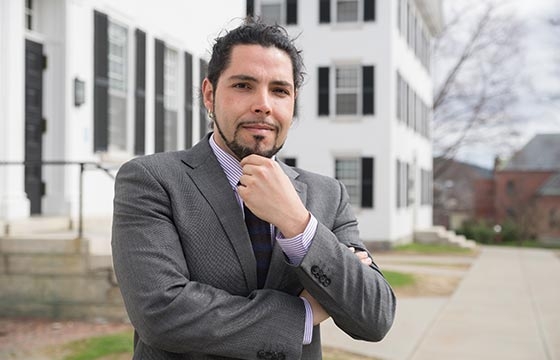As colleges and universities mark the fifth annual National Postdoc Appreciation Week, September 15-19, the Dartmouth College Postdoctoral Association (DCPDA) is again propelling campus postdocs to center stage with unique research presentations. At last year’s Postdoctoral Research Day, the crowd was energized by Dartmouth’s first “research slam.” In December, another performance is in the works, the date to be announced soon.

”The ‘slam’ is a series of fast-paced oral presentations with a twist, almost like theater but you have to talk about your research,“ says E.E. Just Postdoctoral Fellow Salvador Almagro-Moreno, president of the DCPDA, which sponsors the research day. ”You have to present your research in 10 minutes with props, but in a funny way.“
The research day event offers an opportunity for Dartmouth’s postdoc population to come together and share common interests, concerns, and camaraderie.
Postdocs, more formally known as postdoctoral fellows, research associates, or scholars, constitute a growing segment of academia. First emerging in the early 20th century, Sigma Xi, The Scientific Research Society, reports that the number of science and engineering postdocs in the U.S. tripled in the 30 years prior to a 2006 survey. The National Science Foundation reported another 25 percent increase from 2007 to 2010.
”A postdoc is a training period with mentorship. You are developing your own stuff, positioning yourself and learning things, how to write grants, how to develop projects,“ says Almagro-Moreno. ”It is like practicing before a game. You cannot just jump into it. You can’t just know how it is done by watching it. You have to practice first. You have to be ready.“
Almagro-Moreno has been involved with the all-volunteer DCPDA for four years. ”At the association we try to create a sense of community. That can sometimes be challenging because we are a different species,“ he says. ”There are nearly 300 of us of different ages, with different starting times, and less structure, and we have our own needs.“
As a career development officer for the association, Katja Koeppen is catering to some of those needs. ”I have been organizing career development workshops and seminars for the postdoctoral association since 2010 and have seen the DCPDA develop into an important resource for the Dartmouth postdoc community,“ says Koeppen, a postdoctoral research associate in the Department of Microbiology and Immunology at the Geisel School of Medicine.
”DCPDA offers popular workshops on career-related topics such as how to search, apply, interview, and negotiate for jobs in academia, industry, or alternative fields, as well as sessions to improve research presentation and grant writing,“ she says. ”In addition, DCPDA offers cutting edge symposia and social events that enable postdocs from diverse research areas to establish fruitful collaborations.“
DCPDA treasurer Jibran Khokhar is a postdoctoral fellow in the Department of Psychiatry at Geisel, working with Professor Alan Green on improved treatments for co-occurring schizophrenia and alcohol use disorder.
”The support from Dr. Green, combined with the excellent programs available through Dartmouth SYNERGY: The Dartmouth Clinical and Translational Science Institute, Dartmouth Center for the Advancement of Learning (DCAL), and the DCPDA have been monumental in helping me grow as both a researcher and an academic,“ he says. ”Increased support to these initiatives as well as the recently announced Society of Fellows is needed, and will go a long way in fostering an environment in which postdoctoral scholars can succeed and develop into researchers who can benefit our local and global communities."